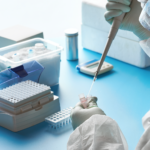 The challenges surrounding testing for the coronavirus have been extremely well documented around the world, with few countries able to secure the right supply of tests that are sufficiently accurate to meet the demands of citizens.
The challenges surrounding testing for the coronavirus have been extremely well documented around the world, with few countries able to secure the right supply of tests that are sufficiently accurate to meet the demands of citizens.
New research from King’s College London advocates a method for testing for COVID-19 without actually having to undergo a swab test. The method is based upon AI, which analyzes the symptoms of the individual, and determines whether they have the virus or not.
The AI system was trained using data from the COVID Symptom Study app developed at the university. By comparing people’s symptoms with the results returned from traditional COVID swab tests, the system was able to accurately predict COVID-19 infection results. The researchers believe this will be especially valuable in areas where testing is limited, and they plan to begin clinical trials in both the United States and United Kingdom shortly.
Smart testing
The app has thus far been downloaded by over 3.3 million people globally, many of whom are using it every day to report their health status. It’s of particular interest among those who are reporting symptoms, including fever, fatigue, persistent coughs, and a loss of taste and/or smell.
The researchers assessed data from around 2.5 million people from across the US and UK, with approximately 1 in 3 of these reporting symptoms linked with COVID-19. Of this group of 800,000 or so people, 18,374 had been officially tested, with 7,178 of them receiving a positive result.
The team examined which symptoms were most likely to have been associated with the positive test, and warn against focusing attention purely on fever and cough. Instead, the loss of taste and smell was especially striking, with 2/3 of those confirmed with the virus suffering from this, suggesting this might be a more important symptom to look for than coughs and fever.
These initial findings were then used to build a model that was able to predict whether someone had COVID-19 with an accuracy of around 80%, based purely on the individual’s age, sex, and a combination of key symptoms, including loss of taste and smell, a persistent cough, skipping meals, and fever.
When the tool was tested, the researchers predicted that 17.42% of those who were unwell were likely to have COVID-19. The researchers believe that the app, and the AI prediction system, could help to identify those who are most likely to be infectious at an early stage, thus allowing tracking and testing to be focused more specifically.
“Our results suggest that loss of taste or smell is a key early warning sign of COVID-19 infection and should be included in routine screening for the disease,” the researchers conclude. “We strongly urge governments and health authorities everywhere to make this information more widely known, and advise anyone experiencing sudden loss of smell or taste to assume that they are infected and follow local self-isolation guidelines.”